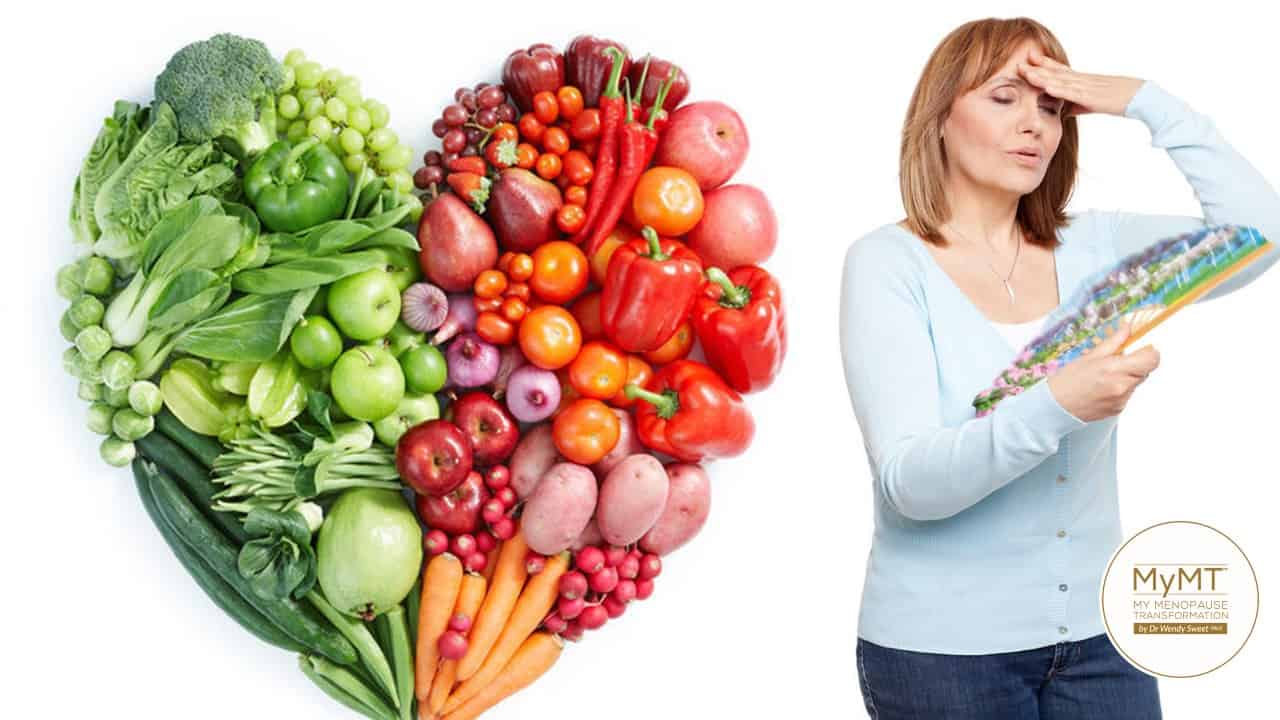Over two years ago when the world went into pandemic-chaos, a scientific paper was published by world-renowned women’s cardiac specialist, Professor Angela Maas and her team. The paper was discussing the female-specific risk factors and inflammatory risk factors that influence a woman’s cardiovascular risk throughout her lifetime. (Maas, Rosano et al, 2021).
In a press release from the European Society of Cardiology (2021), Professor Maas explained,
“High blood pressure is called hypertension in men but in women it is often mistakenly labelled as ‘stress’ or ‘menopausal symptoms’. Furthermore, high blood pressure during pregnancy is a warning sign that hypertension may develop when a woman enters menopause and it is associated with dementia many decades later. If blood pressure is not addressed when women are in their 40s or 50s, they will have problems in their 70s when hypertension is more difficult to treat.”
With it being Heart Health Awareness Week in Australia last week, I was waiting for the various posts in the media about the new research from Professor Maas and her team linking hot flushes with hypertension. As the posts never eventuated last week, I thought I would let you know instead.
Many women are not linking their hot flushes, night sweats and depression to higher blood pressure. However, when I read Professor Maas work and her comment that up to 50% of women develop high blood pressure before the age of 60 but the symptoms – for example hot flushes and palpitations – are often attributed to menopause, rather than hypertension, this made so much sense to me.
Menopause-related hot flashes and night sweats have been linked to a greater risk for high blood pressure and other cardiovascular risk factors. Research also shows depression during the menopause transition is strongly linked to higher cardiovascular disease risk. (El Khoudary & Nasr, 2022).
I speak about the work of Professor Maas in my online Masterclass on Menopause (available online for you HERE) and I also bring it to the attention of Health Practitioners on my professional development course as well as talk about it in my Transform Me and Circuit Breaker programmes for women. Yes, high blood pressure and changing blood vessel status is that important!
Most importantly however, I often tell women to get their blood pressure checked with their Doctor and of course, change their lifestyle to better suit their changing cardiovascular status – some strategies of which I share with you below. If your hot flushes and night sweats are draining your energy levels, then you may want to have a read when you can.
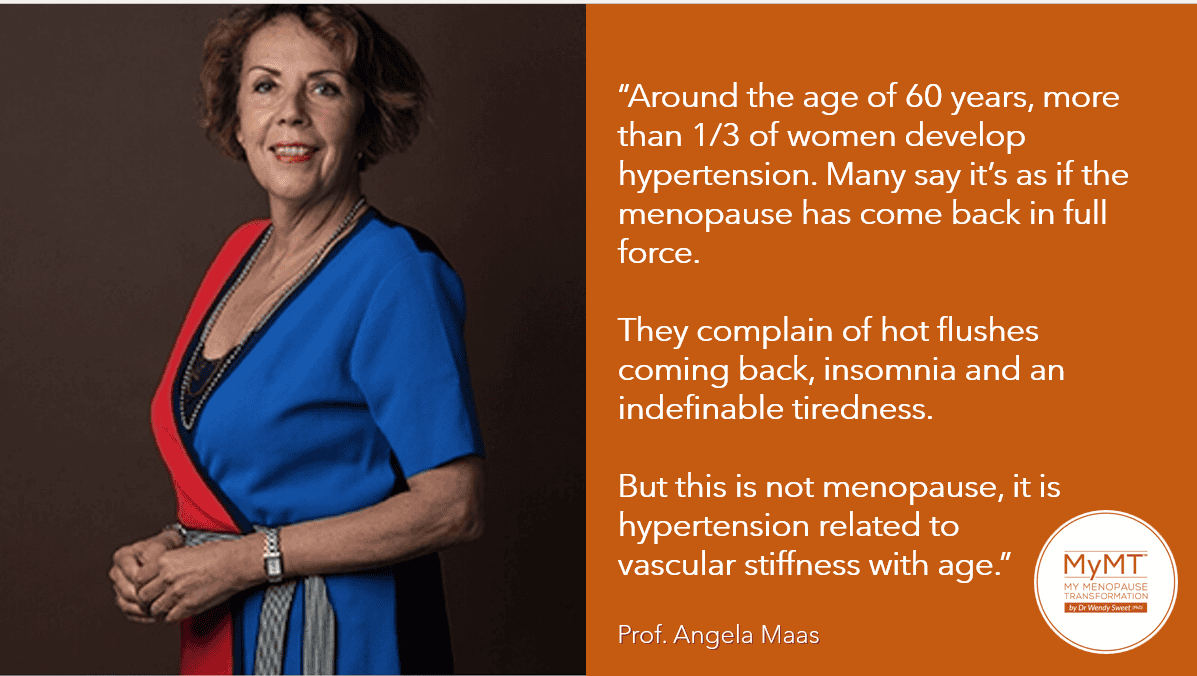
Women’s health literature is full of studies reporting the changes in cardiac function as we age. And I’m not talking about when you are over 70 years. I’m talking about your menopause transition – the time when your biological and reproductive ageing is occurring.
One of the main roles of oestrogens throughout our lifetime, is to regulate vascular (blood vessel) reactivity, blood pressure (BP), endothelial function and cardiac re-modelling. The main type of cell found in the inside lining of blood vessels, lymph vessels, and the heart.
This is why alterations in oestrogen levels during the menopause transition are closely connected to our blood vessel function and our blood pressure.
It’s also why, after menopause, when periods have ended and women enter post-menopause, that a women’s risk for high blood pressure (hypertension) is higher than in her peri-menopause years. During peri-menopause, for women with intact ovaries, oestrogen production, whilst starting to decline, does continue.
Women undergo important changes in sex hormones throughout their lifetime that can impact cardiovascular disease risk.
With the decline in oestrogen levels as we move through menopause, risk factors for coronary heart disease (CHD) become more apparent in women, especially hypertension or high blood pressure. If your blood pressure and/or cholesterol has become elevated as you approached mid-life, you’ll know what I mean. Blood Pressure is ‘high’ when the top number (systolic pressure) is over 140 mmHg and the bottom number (diastolic pressure) is over 80 mmHg.
Furthermore, the onset of hypertension can cause a variety of symptoms that are often attributed to the menopause – if you are experiencing fatigue, hot flushes, aching muscles after exercise, migraines, tinnitus and/or palpitations, then join the club – it could well be your changing blood pressure and blood vessels. So please, go to your Doctor and get your blood pressure checked out when you can, because there’s a little statistic I want to share with you.
Worldwide, 25% of adult women are hypertensive, and in the United States, more than 75% of women older than 60 years of age are hypertensive. [Lima et al., 2012]
Hypertension is a major risk factor for cardiovascular disease in women and men. Whilst it is well controlled and treated with medications in many countries throughout the world (Lancet 2019), what we all need to know, is that cardiovascular disease, which includes high blood pressure, is the leading cause of death in women – especially as we move into post-menopause.
The good news is that we have the power to do something about it through lifestyle change strategies.
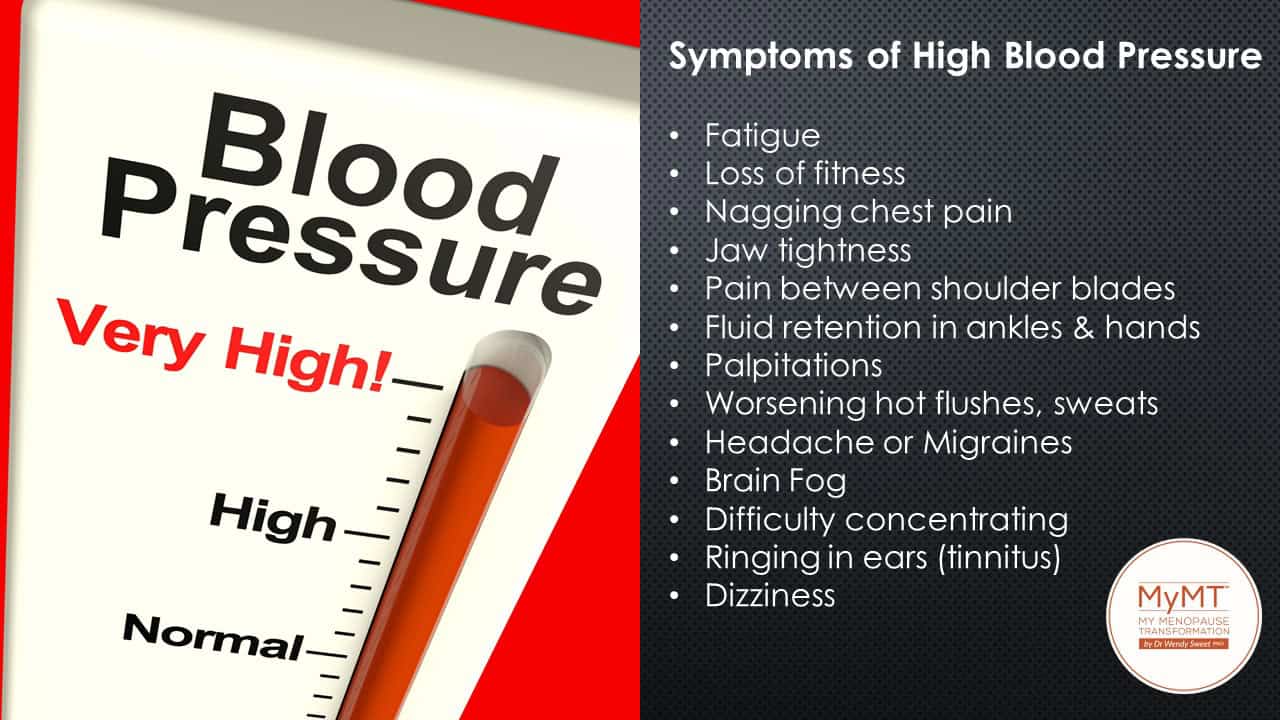
But declining oestrogen isn’t the only contribution to changing heart health, high blood pressure and worsening hot flushes as we move through menopause. You can also add insomnia, past or present history of smoking, high alcohol consumption, too much stress (including physical stress from too much vigorous exercise), being sedentary, family history of heart disease, kidney problems, poor diet and being overweight or obese to the list as well.
So, whether you are on hormonal medications or various menopause supplements or not, what are you doing about your lifestyle too? I have some suggestions for you below.
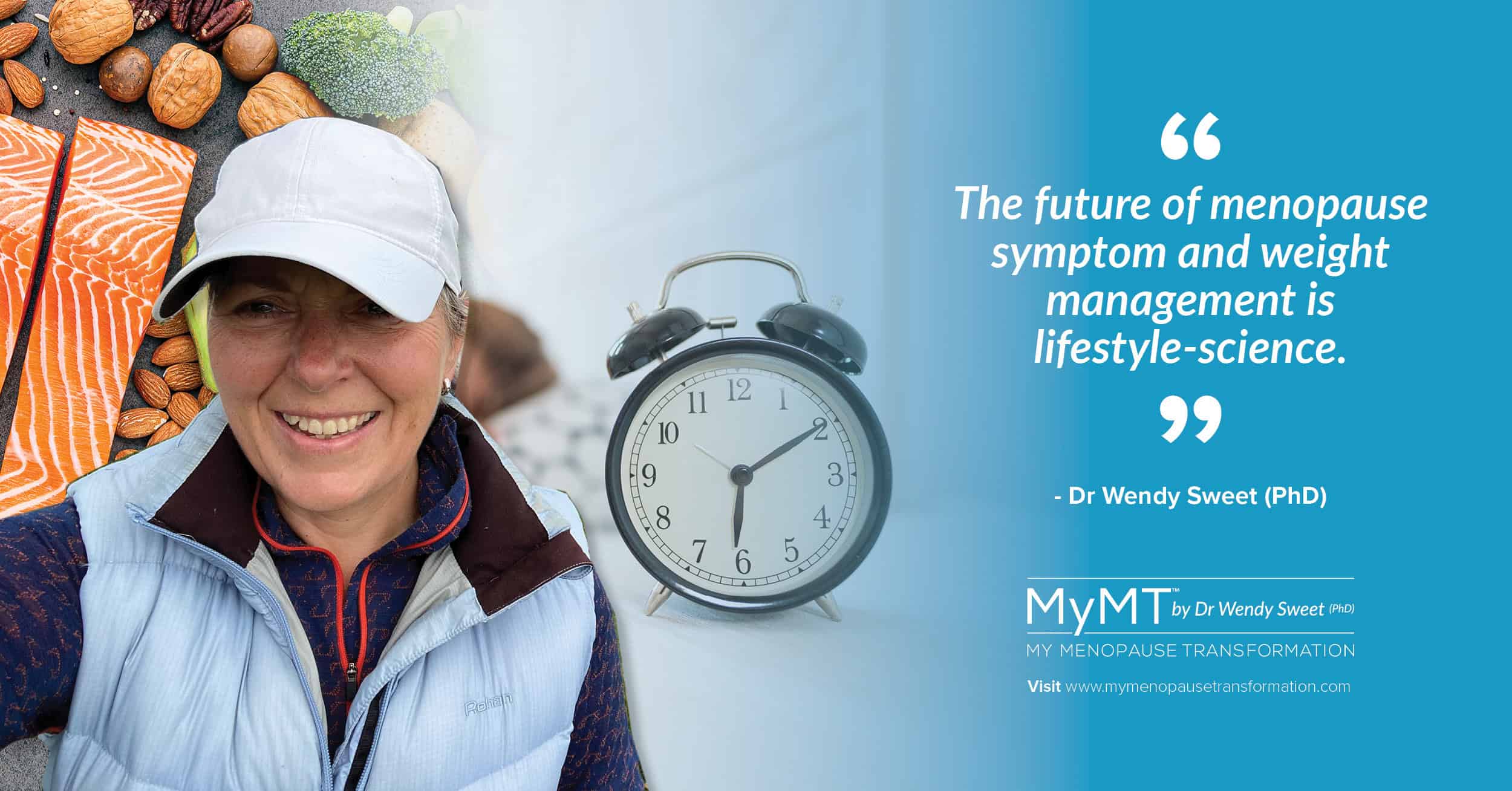
Top-tips for managing your blood pressure during menopause:
- Change your diet. Don’t get fooled by diets that aren’t designed with our blood pressure in mind. All of the women who come on board into the MyMT™ programmes learn how important it is to follow a Mediterranean influenced, anti-inflammatory diet which is evidenced for helping our heart health – and yes, grains are important too. Click HERE to read my blog about this.
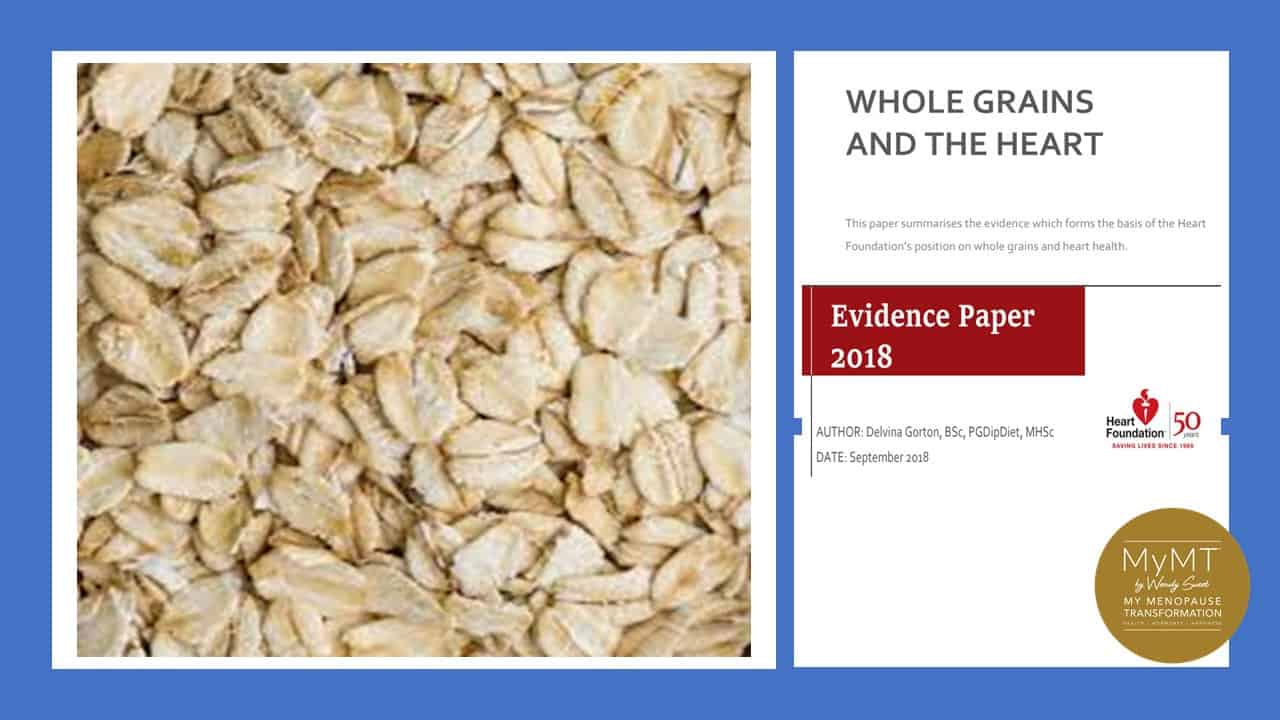
2. Include adequate magnesium and calcium in your diet. Many studies suggest that reduced consumption of calcium or magnesium is associated with an increased risk of developing hypertension and cardiovascular disease. Magnesium (Mg), an essential element in the human body, may have beneficial health effects for the primary prevention of hypertension. You need 400mg of magnesium and 1200mg of calcium daily. Plant-based high magnesium foods include avocado, kale, spinach, nuts and seeds, canned white beans and rye bread.
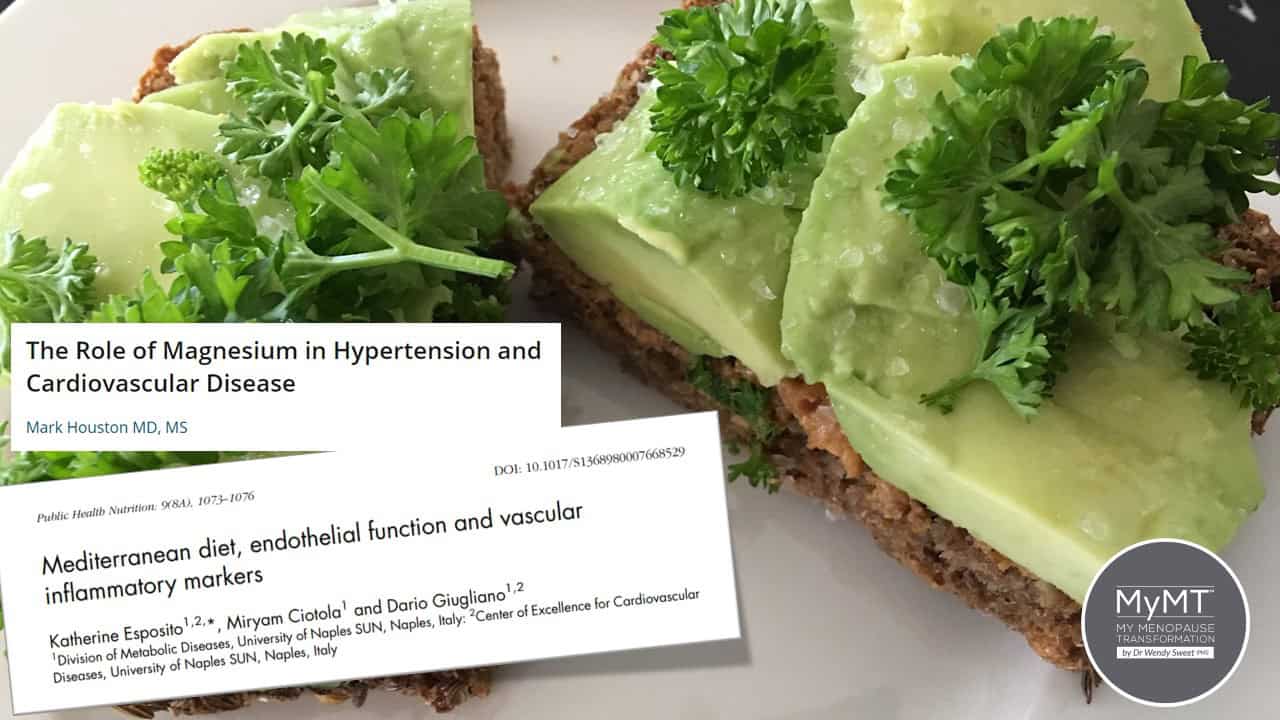
3. Sleep all night and reduce the inflammation that arrives as we age (this includes those of you who participate in heavy physical activity). As the first generation of women to be participating in so many different forms of sport and exercise, it’s important to manage the inflammatory changes that accumulate in your muscles and joints during menopause. If you aren’t sleeping, then you aren’t healing overnight and your immune system doesn’t recover nor does your cardiac muscle.
If you aren’t sleeping, then you must turn this around and in the MyMT™ programmes, I have an emphasis on the circadian rhythm which I’ve researched specific to our menopause transition. Our heart and blood vessels are under the regulation of our day/night cycle as well as our seasonal cycle. Sleeping all night matters to your cardiac health and your blood pressure, (Douma & Gumz, 2019), your weight management and for those of you who are exercising, your sleep matters to your recovery.
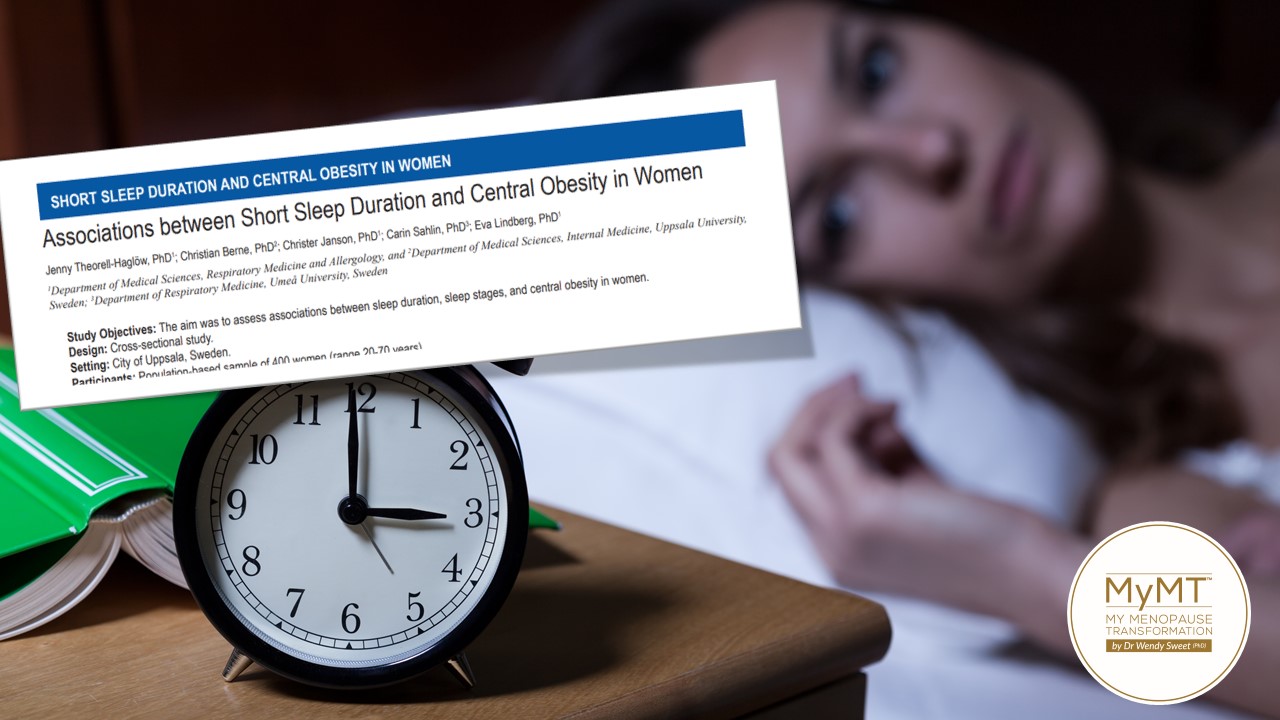
4. Manage your heat regulation and hot flushes by managing your weight gain. Hot flushes are experienced as a feeling of sudden heat in upper part of the body including the face, neck, chest, and arms. They also involve dilation of blood vessels in the skin and an increased heartbeat. Hot flushes can also be caused by underlying health problems, drinking alcohol, using food additives, taking certain medications and increased weight gain. [Sadeghi, Khalili et al, 2012; Kodoth, et al, 2022].
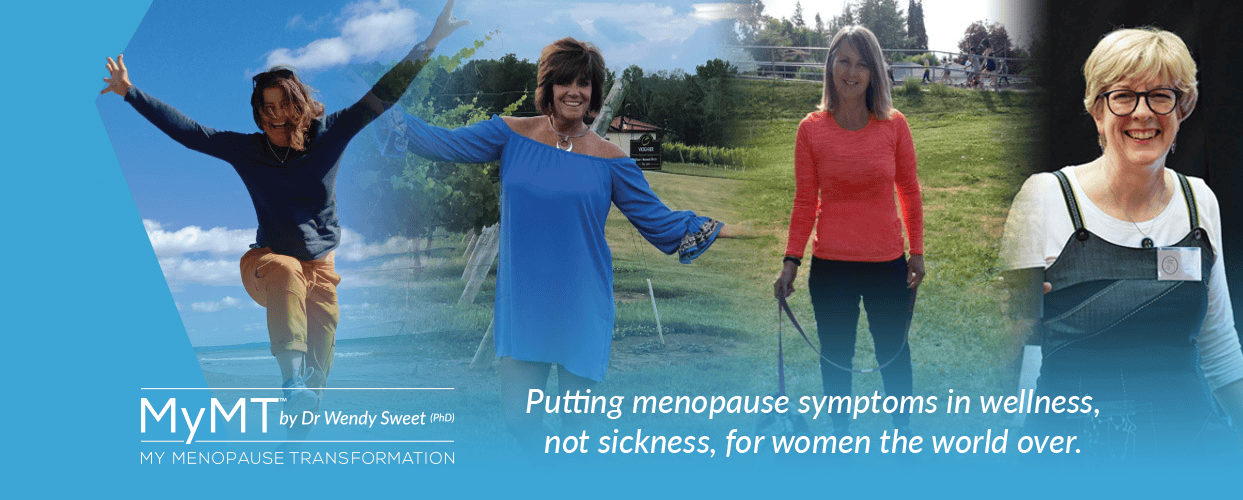
If you are struggling with your symptoms and weight gain, then I hope you can join me sometime in 2023. It would be my privilege to introduce you to the lifestyle change strategies that are evidenced for you as you move through menopause and into your healthy ageing years beyond. If you are struggling with your weight, then my Transform Me programme is for you, otherwise choose the Circuit Breaker programme. You can learn more about these powerful world-class programmes HERE.
You only need 60 minutes a week over the 12 weeks to listen to each module that opens up in your private learning hub and then put the changes into action. As well, my private coaching community is where I post regular updates for you and you stay connected with me too.
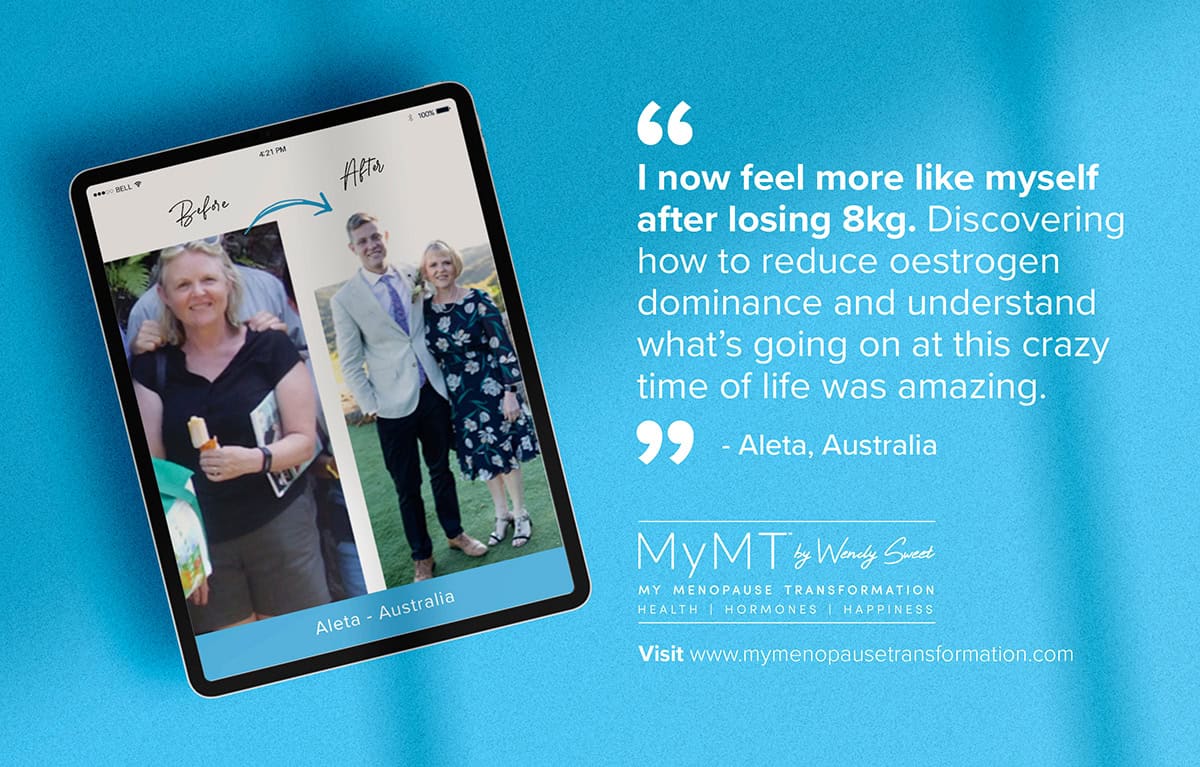
References:
Angeli, F., Reboldi, G., Trapasso, M., Aita, A., & Verdecchia, P. (2019). Managing hypertension in 2018: which guideline to follow?. Heart Asia, 11(1), e011127. https://doi.org/10.1136/heartasia-2018-011127
Angela H E M Maas, Giuseppe Rosano, Renata Cifkova, Alaide Chieffo, Dorenda van Dijken, Haitham Hamoda, Vijay Kunadian, Ellen Laan, Irene Lambrinoudaki, Kate Maclaran, Nick Panay, John C Stevenson, Mick van Trotsenburg, Peter Collins, Cardiovascular health after menopause transition, pregnancy disorders, and other gynaecologic conditions: a consensus document from European cardiologists, gynaecologists, and endocrinologists, European Heart Journal, Volume 42, Issue 10, 7 March 2021, Pages 967–984, https://doi.org/10.1093/eurheartj/ehaa1044
Babiker FA, De Windt LJ, van Eickels M, Grohe C, Meyer R, Doevendans PA. Estrogenic hormone action in the heart: regulatory network and function. Cardiovasc Res. 2002;53(3):709-719. doi:10.1016/s0008-6363(01)00526-0
Coles, L. T., & Clifton, P. M. (2012). Effect of beetroot juice on lowering blood pressure in free-living, disease-free adults: a randomized, placebo-controlled trial. Nutrition journal, 11, 106. https://doi.org/10.1186/1475-2891-11-106
Douma, L. G., & Gumz, M. L. (2018). Circadian clock-mediated regulation of blood pressure. Free radical biology & medicine, 119, 108–114. https://doi.org/10.1016/j.freeradbiomed.2017.11.024
El Khoudary, S. & Nasr, A. (2022). Cardiovascular disease in women: Does menopause matter? Current Opinion in Endocrine and Metabolic Research, Volume 27, 100419.
Jones, T., Dunn, E. L., Macdonald, J. H., Kubis, H. P., McMahon, N., & Sandoo, A. (2019). The Effects of Beetroot Juice on Blood Pressure, Microvascular Function and Large-Vessel Endothelial Function: A Randomized, Double-Blind, Placebo-Controlled Pilot Study in Healthy Older Adults. Nutrients, 11(8), 1792. https://doi.org/10.3390/nu11081792
Kateepe-Arachi T. & Sanjay, S. (2016). Cardiovascular Disease in Women: Understanding Symptoms and Risk Factors. European Cardiology Review 2017;12(1):10–3.
Kodoth V, Scaccia S, Aggarwal B. Adverse Changes in Body Composition During the Menopausal Transition and Relation to Cardiovascular Risk: A Contemporary Review. Womens Health Rep (New Rochelle). 2022 Jun 13;3(1):573-581.
Kim MH, Bu SY, Choi MK. Daily calcium intake and its relation to blood pressure, blood lipids, and oxidative stress biomarkers in hypertensive and normotensive subjects. Nutr Res Pract. 2012 Oct;6(5):421-8.
Lima, R., Wofford, M., & Reckelhoff, J. F. (2012). Hypertension in postmenopausal women. Current hypertension reports, 14(3), 254–260. https://doi.org/10.1007/s11906-012-0260-0
Sadeghi M, Khalili M, Pourmoghaddas M, Talaei M. The correlation between blood pressure and hot flashes in menopausal women. ARYA Atheroscler. 2012 Spring;8(1):32-5.
Sofi F, Cesari F, Casini A, Macchi C, Abbate R, Gensini GF. Insomnia and risk of cardiovascular disease: a meta-analysis. Eur J Prev Cardiol. 2014 Jan;21(1):57-64.
Sunbul EA, Sunbul M, Tastekin N, Ozben B, Sayar N, Gulec H. Is there any relation between arterial stiffness and insomnia? A challenging question. Sleep Breath. 2022 Mar;26(1):333-338. doi: 10.1007/s11325-021-02445-6. Epub 2021 Jul 24. PMID: 34302608.
Zhou, B., Danaei, G. … Ezzati, M. (2019). Long-term and recent trends in hypertension awareness, treatment, and control in 12 high-income countries: an analysis of 123 nationally representative surveys. The Lancet, 394 doi: 10.1016/S0140-6736(19)31145-6
